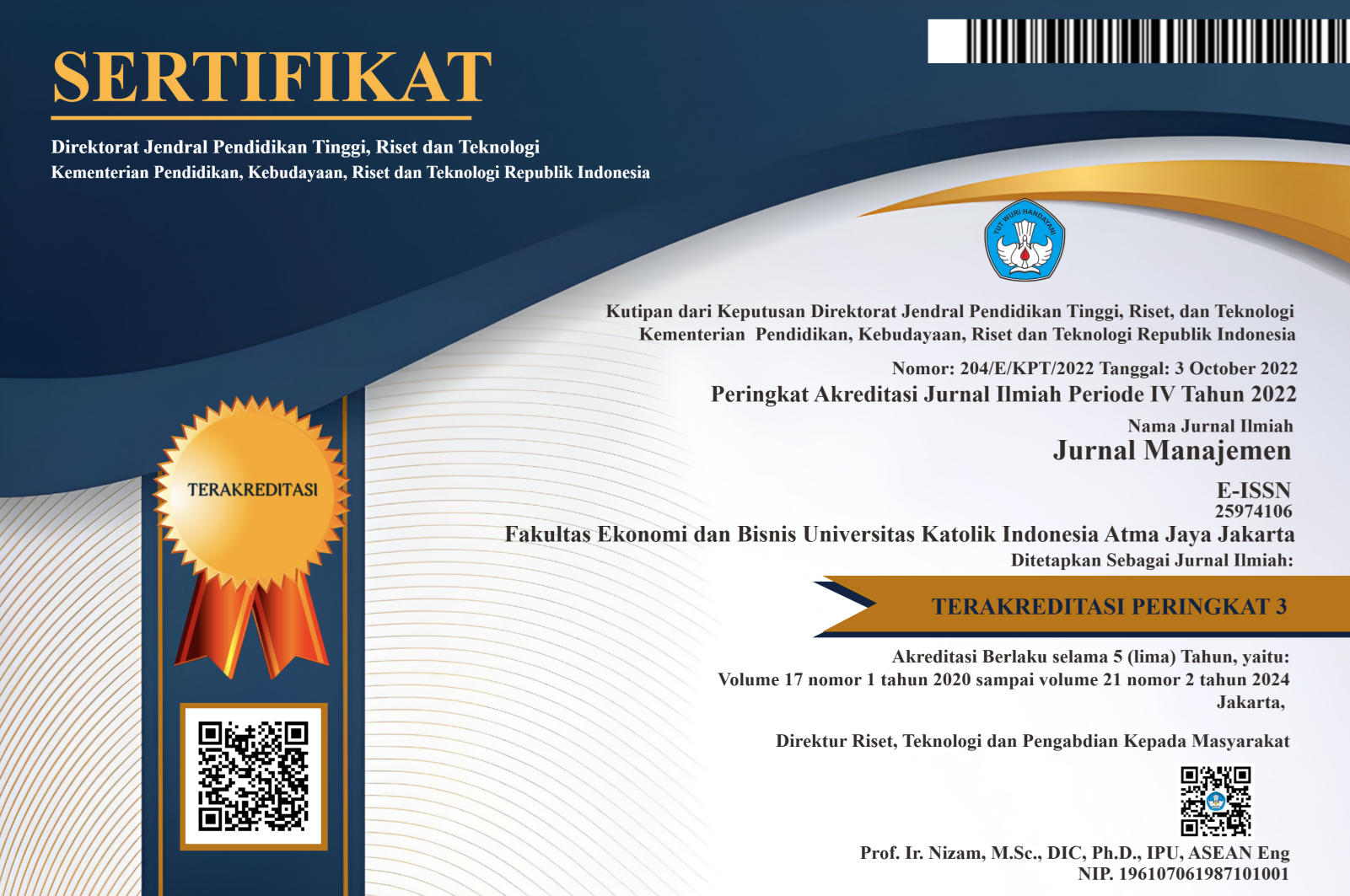EDUCATION VERSUS EXPERIENCE: WHICH MATTERS MORE FOR INDONESIAN BANK DIRECTORS?
DOI:
https://doi.org/10.25170/jm.v13i2.802Keywords:
Board Of Directors, Education, Experience, Firm Performance, Upper EchelonAbstract
The purpose of this paper is to assess the effects of board of directors’ education and experience on firm
financial performance. Based on the cross-sectional analysis of 30 publicly-listed Indonesian banks, it is
found that both directors’ education and experience positively influence bank profitability, measured with
Return on Assets ratio. The results of this study support Hambrick and Mason’s Upper-Echelon theory.
Based on the research findings, Indonesian banks are recommended to take experience and education into
account when organizing board members—with more emphasis on the former due to the moresignificant
impact it has. Furthermore, banks should also be encouraged to invest more in their human capital by
facilitating further education of their board members.
References
Bravo, F. and Reguera-Alvarado, N. (2017), The effect of board of directors on R&D intensity: board tenure and multiple directorships. R&D Management. doi:10.1111/radm.12260
Chiliya, N. and Roberts-Lombard, M. (2012). Impact of Level of Education and Experience on Profitability of Small Grocery Shops in South Africa. International Journal of Business Management and Economic Research, 3(1), 462-470
Cimerova, H. (2012). The Influence of CEO Experience and Education of Firm Policies. Nova School of Business and Economics.
Darmadi, S. (2013). Board Members’ Education and Firm Perormance: Evidence from a Developing Company. International Journal of Commerce and Management, 23(2), 113- 135. DOI 10.1108/10569211311324911
Falato, A., Li, D., and Milbourn, T. (2015). Which Skills Matter in the Market for CEOs? Evidence from Pay for CEO Credentials. Management Science, 61(12), 2845-2869.
Gantenbein, Pascal A. and Volonté, Christophe, Directors’ Human Capital, Firm Strategy, and Firm Performance (December 23, 2014). Journal of Management and Governance, DOI:10.1007/s10997-014-9304-y
Hambrick, D.C. and Mason, P.A. (1984) Upper Echelons: The Organization as a Reflection of Its Top Managers. The Academy of Management Review, 9(2), 193-206.
King, T., Srivastav, A., and Williams, J. (2016). What’s in an Education? Implications of CEO education for Bank Performance. Journal of Corporate Finance, http://dx.doi.org/10.1016/j.jcorpfin.2016.01.003
Phan, H. (2016). Board of Diretor Education and Firm Performance: A Dynamic Approach. Aalto University. Master’s Thesis.
Shiah‐Hou, S. and Cheng, C. (2012). Outside director experience, compensation, and performance. Managerial Finance, 38(10), 914-938, doi:
10.1108/03074351211255146
Stimpert, J.L., Chesley, J.A., and Ostrowitz, A.S. (2010). The Insiders’ Advantage: CEO Experience and the Performance of Large Diversified Firms. Journal of Business &
Leadership, 6(1), 62-71.
Downloads
Published
Issue
Section
License
Authors who publish with this journal agree to the following terms:
Authors retain copyright and grant the journal right of first publication with the work simultaneously licensed under a Creative Commons Attribution-NonCommercial-ShareAlike License that allows others to share the work with an acknowledgement of the work's authorship and initial publication in this journal.
Authors are able to enter into separate, additional contractual arrangements for the non-exclusive distribution of the journal's published version of the work (e.g., post it to an institutional repository or publish it in a book), with an acknowledgement of its initial publication in this journal.
Authors are permitted and encouraged to post their work online (e.g., in institutional repositories or on their website) prior to and during the submission process, as it can lead to productive exchanges, as well as earlier and greater citation of published work (See the Effect of Open Access).












